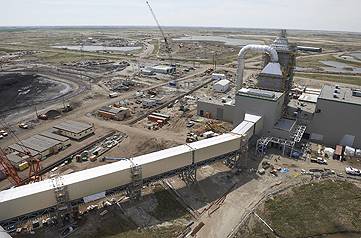IEA Hails Launch of Carbon Capture and Storage Project
Canada’s Boundary Dam is reported to be the world’s first large-scale power station to trap CO2.
The International Energy Agency (IEA) welcomed the launch of the world’s first large-scale power station equipped with carbon capture and storage (CCS) technology, calling it a historic milestone along the road to a low-carbon energy future.
The 110MW retrofit of SaskPower’s Boundary Dam coal-fired power plant in Saskatchewan, Canada will trap around 1 million tonnes of carbon dioxide (CO2) per year. The captured CO2 will be injected into nearby oilfields to enhance oil recovery. The plant began capturing CO2 in September and was due to be inaugurated this week.
IEA Executive Director Maria van der Hoeven said the launch represents “a momentous point” in the history of the development of CCS, the family of technologies and techniques that enable the capture of CO2 from fuel combustion or industrial processes, its transport via ships or pipelines, and its storage underground. She added: “CCS is the only known technology that will enable us to continue to use fossil fuels and also de-carbonise the energy sector. As fossil fuel consumption is expected to continue for decades, deployment of CCS is essential.”
The IEA Executive Director also commended Canada’s role in making the project a reality: “Getting Boundary Dam up and running is a great example of how Canada is a leader in CCS,” she said. “The experience from this project will be critically important. I wish the plant operator every success in showing the world that large-scale capture of CO2 from a power station is indeed not science fiction, but today’s reality.”
The IEA believes CCS will have to play a central role in an ambitious, climate-friendly future energy scenario, accounting for one-sixth of required emissions reductions by 2050. IEA analysis has shown that without significant deployment of CCS, more than two-thirds of current proven fossil-fuel reserves cannot be commercialised before 2050 if the increase in global temperatures is to remain below 2 degrees Celsius.
Several CCS projects are under construction or in advanced stages of planning. Early 2015 should see the start of operations for another large power-CCS project in Kemper County, Mississippi. Further projects are currently under construction elsewhere in the United States and Canada plus Saudi Arabia and Australia.












